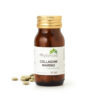REISHI ganoderma lucidum
€24.00
Reishi Ganoderma 500mg A truly complete medicinal mushroom
More energy, strong bones, help in menopause, effective immune defense against infections or allergies, autoimmune diseases, excellent for the liver, bile, heart
Reishi ( Ganoderma lucidum)
Reishi or Ganoderma is a saprophytic fungus from oaks and chestnut trees. It contains about 4000 bioactive compounds, mainly beta-glucans: Amino acids, polysaccharides, proteins, fats, carbohydrates, mineral salts (iron, zinc, copper, manganese, magnesium, potassium, calcium and germanium), vitamin B and polysaccharides (glucose, galactose, mannose with traces of xylose and fucose), sterols (hormone precursors), triterpenes and acids (lucidic, gahnoderm and genoluxide).
Reishi has been identified as one of the 10 most effective natural healing substances in nature and is one of the most widely used mushrooms in fungal therapy. This fungus grows in the wetlands of the Chinese coast in chestnut, oak and other broad-leaved trees, and in Japan it grows in the bark of old plum trees. Its shape resembles a kidney, it is bright and bright red, but it can also take other colours.
It is a powerful anti-inflammatory that gives effects similar to those of cortisone, without the typical side effects of this drug.
It restores the immune system to almost full function, which gradually stops producing autoantibodies, which are responsible for autoimmune diseases affecting certain parts of the body such as : Hashimoto’s thyroiditis, Graves’ disease, rheumatoid arthritis, Sjögren’s syndrome (systemic lupus erythematosus), myasthenia, scleroderma, autoimmune connective tissue disease and others. .
Because of its richness of ingredients, it is an excellent
- analgesic
- immunomodulatory
- anti-inflammatory
- antibacterial
- antiviral
- antioxidant
- hypotensive
- cardiotonic
- cholesterol reducer
- adjuvant of corticoid functions
- mucolytic
- antihistamine (the action of glutamic acid which acts
- by reducing histamine)
In addition, Reishi contains a dose of pantothenic acid (vitamin B5) that acts on the nervous system, nourishing and balancing it, relieving fatigue and reducing insomnia problems.
Finally
it acts on the liver as a hepatoprotective and detoxifying agent and on the digestive system by regulating the production of gastric fluids.
Because of its properties, it is called the king of herbal medicine; the ancient Chinese even called it the ‘plant of spirit and immortality’.
It is recommended to take it for at least 2-3 months.
Instructions of use
1 tablet with plenty of water 2 or 3 times a day
It is recommended to take it for at least 2-3 months
Ingredienti
Reishi (ganoderma lucidum) dry extract
60 tablets x500 mg
You may also like…
Antiage-Antioxidants

 Ελληνικα
Ελληνικα Italiano
Italiano







